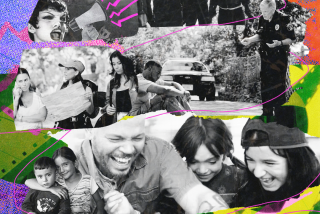Canceled by the coronavirus, SXSW Film Festival takes steps to help the movies
When the South By Southwest Film Festival was canceled one week before it was set to begin, it left filmmakers scrambling.
The big question for so many — What happens next?
On Friday, the day the event was originally intended to start, the festival announced that it will move ahead with its juried awards. With 10 films each in the lineups for the narrative and documentary feature awards, as well as short film prizes and a handful of special awards, the winners will be announced Tuesday, March 24.
In a statement, longtime South By Southwest director of film Janet Pierson made her first public comments since the cancellation of this year’s festival. In it she said that after the event was canceled by the city of Austin, “The SXSW Film Fest immediately hunkered down to figure out what could we do to help and support the filmmakers whose work we love so much, and who put their trust and faith in SXSW for their launch. Many of them have spent years on the work they were bringing to SXSW.
“This was going to a transformative event, and with the cancellation, the filmmakers were left stranded and scrambling,” Pierson’s statement continued. Regarding giving out the awards without the public festival, she said, “We know it’s no substitute for the live SXSW event with its unique and fantastic audience, but at least it’s some way to get attention for these wonderful films.”
The festival was set to open with the world premiere of Judd Apatow’s dramedy “The King of Staten Island,” starring Pete Davidson. The film, expected to be released by Universal in June, was also scheduled to play at the upcoming Tribeca Film Festival in April, which was also canceled this week.
SXSW is a qualifying festival for the Film Independent Spirit Awards and the Academy Awards short film categories, and the festival confirmed that status remains in place for this year’s movies. All films selected for the festival may use the laurels of the festival on marketing materials.
Additionally, filmmakers may opt-in to have their films included in an online screening library being made available to press, buyers and the industry during the original dates of the festival, the 13th through Saturday the 21st.
There were over 100 features films and episodic projects scheduled to play at this year’s film festival. The series of events that constitute the larger South By Southwest program including music, technology and more, last year was attended by more than 417,000 people in Austin, Texas, including 73,000 for the film festival.
As soon as the festival was canceled last week, many filmmakers were left trying to figure out where their films might now have their world premieres or how to get in front of buyers and press.
Even as filmmakers made back up plans for alternate screenings in Austin, Los Angeles, New York or elsewhere, those efforts have been further upended by a fast-changing situation, as many private screening rooms have shut down due to health concerns.
Coachella, SXSW, “Hamilton,” the next “Fast and Furious” movie and even Disneyland have been affected by the coronavirus. But wait — there’s more.
Some filmmakers are encouraging any reviews or press they can get, while others are asking that any coverage be embargoed until they can reconfigure their launch strategy. The website Indiewire, a regular presence at film festivals, has announced it will cover SXSW content as if the festival was proceeding.
Kris Rey, writer and director of mid-life crisis comedy “I Used To Go Here,” starring Gillian Jacobs and Jemaine Clement, has been to SXSW numerous times before, including in 2009 for the premiere of her debut feature “It Was Great, But I Was Ready To Go Home.” She spent the days following the cancellation of this year’s festival trying to figure out alternate screening plans, hoping to get her film screened for press and buyers.
“I don’t know what the right move is and nobody does,” said Rey. “It’s kind of like everyone’s best guess. It’s so unprecedented. For me, my biggest desire is to show this in a theater full of people. It’s a comedy. It’s fun. I really want to stand up there with my cast and present this film.”
Justine Bateman, who was to make her feature directing debut with the narrative competition title “Violet,” a drama of self-discovery starring Olivia Munn, said she was on an email chain with other SXSW filmmakers sharing ideas and offers for what to do next.
“I don’t feel in a rush to get it out there,” Bateman said, acknowledging that not all filmmakers are in the same position as her. “Hopefully, things will calm down soon. And then, I’d really love to have that festival experience, but if it looks like everything’s just going terribly south, then we’ll come up with another plan. Right now, I’m just sort of holding and just waiting.”
Alice Gu was set to make her feature directing debut as part of the documentary competition with “Donut King,” the story of Ted Ngoy, the Cambodian immigrant who went on to own a chain of doughnut shops throughout California. She has likewise been communicating with the other filmmakers in her section.
“That certainly has been a silver lining, that we’ve been able to reach out to each other and find comfort with each other,” Gu said. Regarding having prizes without a public event, she added, “Everybody’s worked so hard and while we don’t get the festival experience, the parties and red carpets and all that fun stuff, it is an opportunity to be recognized, which I think is a really nice thing for the festival to do.”
“The most devastating thing is that the 10 of us who were premiering our films for the first time, that took years of our lives to make and that we really sacrificed for, it’s not about selling a film entirely,” said filmmaker Nicole Riegel, who was making her feature debut with “Holler,” a semi-autobiographical drama of small town life starring Jessica Barden, as part of the 10 films in the narrative competition. “We can still do that. It’s that moment at a festival debut that is very special to us that we want. We lost something that’s not about money.”
Amy Seimetz has a long history with South By Southwest. She was there as an associate producer on Barry Jenkins’ debut feature “Medicine For Melancholy” in 2008, met many future collaborators there and also premiered her feature directing debut “Sun Don’t Shine” in 2012. This year she was going to premiere her second feature as director “She Dies Tomorrow,” an intense psychodrama starring Kate Lyn Sheil, Kentucker Audley and Jane Adams.
Having come up the ranks of the indie film world, Seimetz expressed sympathy and support for the first-time filmmakers who may lack the resources and support of managers and agents and had their hard-earned premieres canceled.
“That’s what makes me really upset and I’m trying to figure out how to support them,” Seimetz said. “I feel like all of us are banding together to find the way forward keeping in the spirit of how supportive that environment is when you get to the festival.
“Independent film lives and breathes with people who have the spirit of, ‘let’s just go do something,’ ” Seimetz said.
As festival organizers have tried to salvage something from this year’s thwarted event, it is that sense of community and shared purpose that pushes people forward.
Pierson’s statement concluded by saying, “We have been heartened by the efforts of so many in the film industry and wider film community to come together with offers to help SXSW projects by offering screening rooms, fee waivers, and so many ways. We are continuing to explore other ways to support the paths of the SXSW 2020 Official Selection films and filmmakers in this new environment.”
As Rey said of all the effort toward a festival that never happened, whether it be actually making a film, booking flights or planning a premiere party, “It’s such a strange thing to be pregnant for so long and not give birth.”
More to Read
Only good movies
Get the Indie Focus newsletter, Mark Olsen's weekly guide to the world of cinema.
You may occasionally receive promotional content from the Los Angeles Times.












